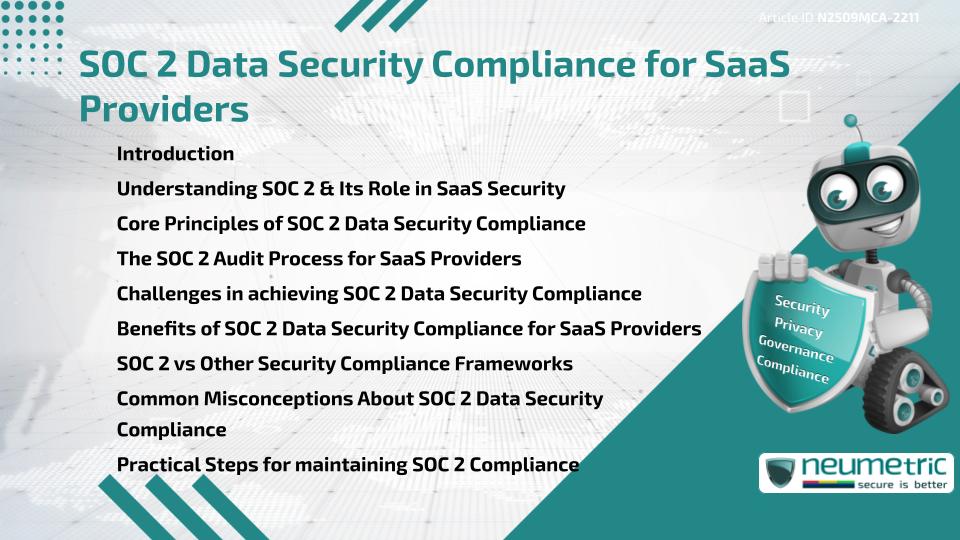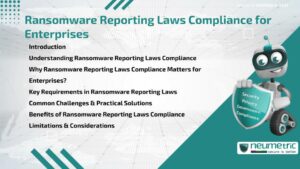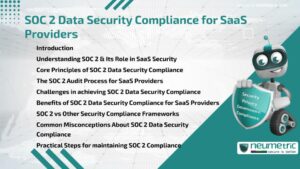Table of Contents
ToggleIntroduction
SOC 2 Data Security compliance is a vital Framework for Software as a Service [SaaS] providers that handle Sensitive Customer Information. It is designed to ensure that cloud-based businesses implement strict controls for protecting data, building trust & demonstrating accountability. Achieving SOC 2 compliance involves an independent Audit based on the Trust Services Criteria, covering areas such as security, availability, processing integrity, confidentiality & Privacy. For SaaS Providers, the process may be demanding but offers significant rewards, including competitive advantage, stronger internal security & Customer confidence. This article explains the principles, Audit process, challenges, benefits & misconceptions of SOC 2 Data Security compliance, with practical advice for providers.
Understanding SOC 2 & Its Role in SaaS Security
SOC 2, short for Service organisation Control 2, was developed by the American Institute of Certified Public Accountants [AICPA]. Unlike Financial reporting audits, SOC 2 focuses on Data Security & operational controls. For SaaS Providers, it provides a clear benchmark for evaluating & demonstrating their ability to protect Customer Data. In today’s market, where customers often entrust providers with highly sensitive business & Personal Information, SOC 2 Data Security compliance has become both a necessity & a mark of quality.
For further details, see the AICPA overview of SOC 2.
Core Principles of SOC 2 Data Security Compliance
SOC 2 compliance is guided by five Trust Services Criteria:
- Security: Protecting systems against unauthorised access.
- Availability: Ensuring systems are operational & accessible as needed.
- Processing integrity: Delivering accurate & complete system processing.
- Confidentiality: Safeguarding Sensitive Information from disclosure.
- Privacy: Managing Personal Information responsibly.
Each SaaS provider tailors its compliance approach based on the nature of its services, ensuring that the controls implemented align with its operational needs & Customer expectations.
The SOC 2 Audit Process for SaaS Providers
The path to SOC 2 Data Security compliance involves a structured Audit process:
- Preparation: Identifying relevant Trust Services Criteria & Defining Scope.
- Gap Analysis: Evaluating current practices against SOC 2 requirements.
- Implementation: Addressing weaknesses through improved controls.
- Audit: Engaging an independent auditor to test & evaluate systems.
- Report issuance: Receiving a SOC 2 Type I or Type II report.
A Type I report evaluates controls at a specific point in time, while a Type II report assesses how controls perform over an extended period. Both are valuable, but Type II is often more trusted by customers.
Challenges in achieving SOC 2 Data Security Compliance
For SaaS Providers, SOC 2 compliance can be challenging. The Audit requires significant time & Financial resources, especially for smaller Organisations. Many providers face difficulties in documenting Policies, implementing technical safeguards & maintaining Evidence of compliance. The scope of SOC 2 is flexible, but this flexibility can also cause uncertainty about which controls to prioritise. Providers must balance operational needs with rigorous Audit requirements.
Benefits of SOC 2 Data Security Compliance for SaaS Providers
Despite the challenges, the advantages of compliance are compelling. SOC 2 compliance enhances Customer Trust by demonstrating a provider’s dedication to safeguarding information. It can also reduce the Risk of data breaches by enforcing strong internal controls. Providers who undergo the process often report improvements in efficiency, accountability & security awareness among staff. Additionally, SOC 2 compliance is frequently a requirement for securing enterprise-level contracts, giving providers a competitive edge.
SOC 2 vs Other Security Compliance Frameworks
SOC 2 is often compared to frameworks such as ISO 27001, HIPAA & FedRAMP. ISO 27001 is an international Standard focused on Information Security management systems, while SOC 2 is more flexible & tailored to U.S.-based service Organisations. HIPAA applies specifically to Healthcare data, whereas SOC 2 has a broader scope. FedRAMP, meanwhile, is mandatory for cloud providers serving U.S. federal agencies. For SaaS Providers, SOC 2 is usually the most practical Framework for addressing diverse Customer needs while demonstrating security maturity.
Additional details are available from NIST’s Cybersecurity resources.
Common Misconceptions About SOC 2 Data Security Compliance
Several misconceptions can hinder SaaS Providers. Some believe SOC 2 compliance is optional, but for many industries, it is a prerequisite for doing business. Others assume it is a one-time project; in reality, compliance requires ongoing effort to maintain. Another misconception is that SOC 2 audits are purely technical. In truth, organisational culture, training & Governance play critical roles in achieving compliance.
Practical Steps for maintaining SOC 2 Compliance
SaaS Providers must treat SOC 2 Data Security compliance as a continuous practice. Effective strategies include:
- Conducting regular internal audits to identify gaps.
- Training Employees on compliance responsibilities.
- Using automation tools for monitoring & Evidence collection.
- Keeping documentation updated & accessible.
- Partnering with experienced Auditors to stay aligned with evolving standards.
Providers can explore guidance from the Cloud Security Alliance to strengthen their practices.
Conclusion
SOC 2 Data Security compliance provides SaaS Providers with a trusted Framework for protecting Customer Data & ensuring accountability. Although the process involves challenges, the benefits-such as enhanced trust, operational efficiency & competitive advantage-far outweigh the difficulties. Providers who commit to SOC 2 compliance are better positioned to thrive in a security-conscious market.
Takeaways
- SOC 2 compliance focuses on five Trust Services Criteria.
- Audits can result in either Type I or Type II reports.
- Achieving compliance requires significant effort & investment.
- Benefits include stronger Customer Trust & market competitiveness.
- Compliance is ongoing, not a one-time exercise.
FAQ
What is SOC 2 Data Security compliance?
It is a Framework that ensures service providers implement strong controls to protect Customer Data based on the Trust Services Criteria.
Who requires SOC 2 compliance?
SaaS Providers & other service Organisations that handle Sensitive Data often need SOC 2 compliance to meet Customer expectations.
How long does a SOC 2 Audit take?
A Type I Audit may take a few months, while a Type II Audit typically takes six (6) to twelve (12) months due to its extended evaluation period.
What is the difference between SOC 2 Type I & Type II?
Type I assesses controls at a point in time, while Type II evaluates the effectiveness of controls over a longer period.
Is SOC 2 compliance mandatory?
It is not a legal requirement, but many enterprises make it mandatory for their vendors as part of due diligence.
How often should SOC 2 audits be performed?
Most providers undergo annual audits to maintain compliance & Customer confidence.
Does SOC 2 apply to international SaaS Providers?
Yes, while it is U.S.-based, international SaaS Providers often pursue SOC 2 compliance to serve global customers.
Need help for Security, Privacy, Governance & VAPT?
Neumetric provides organisations the necessary help to achieve their Cybersecurity, Compliance, Governance, Privacy, Certifications & Pentesting needs.
Organisations & Businesses, specifically those which provide SaaS & AI Solutions in the Fintech, BFSI & other regulated sectors, usually need a Cybersecurity Partner for meeting & maintaining the ongoing Security & Privacy needs & requirements of their Enterprise Clients & Privacy conscious Customers.
SOC 2, ISO 27001, ISO 42001, NIST, HIPAA, HECVAT, EU GDPR are some of the Frameworks that are served by Fusion – a SaaS, multimodular, multitenant, centralised, automated, Cybersecurity & Compliance Management system.
Neumetric also provides Expert Services for technical security which covers VAPT for Web Applications, APIs, iOS & Android Mobile Apps, Security Testing for AWS & other Cloud Environments & Cloud Infrastructure & other similar scopes.
Reach out to us by Email or filling out the Contact Form…





